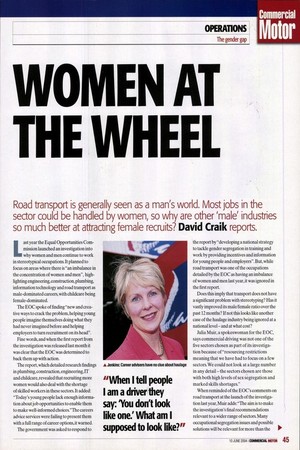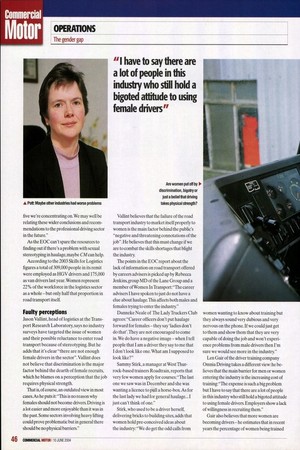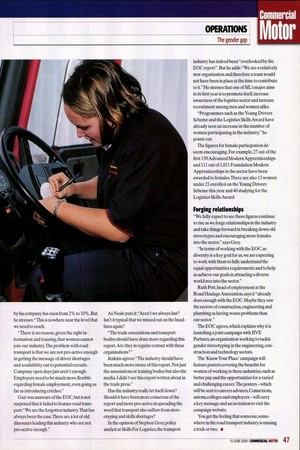WOMEN AT
Page 39

Page 40

Page 41

If you've noticed an error in this article please click here to report it so we can fix it.
THE WHEEL
Road transport is generally seen as a man's world. Most jobs in the sector could be handled by women, so why are other 'male' industries
so much better at attracting female recruits? David Craik reports.
Last year the Equal Opportunities Commission launched an investigation into why women and men continue to work in stereotypical occupations. It planned to focus on areas where there is "an imbalance in the concentration of women and men", highlighting engineering, construction, plumbing, information technology and road transport as male-dominated careers, with childcare being female-dominated.
Last year the Equal Opportunities Commission launched an investigation into why women and men continue to work in stereotypical occupations. It planned to focus on areas where there is "an imbalance in the concentration of women and men", highlighting engineering, construction, plumbing, information technology and road transport as male-dominated careers, with childcare being female-dominated.
Last year the Equal Opportunities Commission launched an investigation into why women and men continue to work in stereotypical occupations. It planned to focus on areas where there is "an imbalance in the concentration of women and men", highlighting engineering, construction, plumbing, information technology and road transport as male-dominated careers, with childcare being female-dominated.
The EOC spoke of finding "new and creative ways to crack the problem, helping young people imagine themselves doing what they had never imagined before and helping employers to turn recruitment on its head".
Fine words, and when the first report from the investigation was released last month it was clear that the EOC was determined to back them up with action.
The report, which detailed research findings in plumbing, construction, engineering, TT and childcare, revealed that recruiting more women would also deal with the shortage of skilled workers in these sectors. It added: "Today's young people lack enough information about job opportunities to enable them to make well-informed choices."The careers advice services were failing to present them with a full range of career options, it warned. The government was asked to respond to
the report by "developing a national strategy to tackle gender segregation in training and work by providing incentives and information for young people and employers". But, while road transport was one of the occupations detailed by the EOC as having an imbalance of women and men last year, it was ignored in the first report.
Does this imply that transport does not have a significant problem with stereotyping? Has it vastly improved its male/female ratio over the past 12 months? If not this looks like another case of the haulage industry being ignored at a national level — and at what cost?
Julia Muir, a spokeswoman for the EOC, says commercial driving was not one of the five sectors chosen as part of its investigation because of "resourcing restrictions meaning that we have had to focus on a few sectors. We could not look at a large number in any detail — the sectors chosen are those with both high levels of sex segregation and marked skills shortages." When reminded of the EOC's comments on road transport at the launch of the investigation last year, Muir adds: "The aim is to make the investigation's final recommendations relevant to a wider range of sectors. Many occupational segregation issues and possible solutions will be relevant for more than the
five we're concentrating on.We may well be relating these wider conclusions and recommendations to the professional driving sector in the future."
As the EOC can't spare the resources to finding out if there's a problem with sexual stereotyping in haulage, maybe CM can help.
According to the 2003 Skills for Logistics figures a total of 309,000 people in its remit were employed as HGV drivers and 175,000 as van drivers last year. Women represent 22% of the workforce in the logistics sector as a whole — but only half that proportion in road transport itself.
Faulty perceptions
Jason Vallint, head of logistics at the Transport Research Laboratory, says no industry surveys have targeted the issue of women and their possible reluctance to enter road transport because of stereotyping. But he adds that it's clear "there are not enough female drivers in the sector". Vallint does not believe that discrimination is the major factor behind the dearth of female recruits, which he blames on a perception that the job requires physical strength.
That is, of course, an outdated view in most cases. As he puts it: "This is no reason why females should not become drivers. Driving is a lot easier and more enjoyable than it was in the past. Some sectors involving heavy lifting could prove problematic but in general there should be no physical barriers."
Vallint believes that the failure of the road transport industry to market itself properly to women is the main factor behind the public's "negative and threatening connotations of the job". He believes that this must change if we are to combat the skills shortages that blight the industry.
The points in the EOC report about the lack of information on road transport offered by careers advisers is picked up by Rebecca Jenkins, group MD of the Lane Group and a member of Women In Transport:"The career advisers I have spoken to just do not have a clue about haulage. This affects both males and females trying to enter the industry."
Danneke Neale of The Lady Truckers Club agrees:"Career officers don't put haulage forward for females — they say 'ladies don't do that'.They are not encouraged to come in. We do have a negative image — when I tell people that Jam a driver they say to me that I don't look like one. What am I supposed to look like?"
Sammy Stirk, a manager at West Thurrock-based trainers Roadtrain, reports that very few women apply for courses: "The last one we saw was in December and she was wanting a licence to pull a horse-box. As for the last lady we had for general haulage... I just can't think of one." Stirk, who used to be a driver herself, delivering bricks to building sites, adds that women hold pre-conceived ideas about the industry: "We do get the odd calls from
women wanting to know about training but they always sound very dubious and very nervous on the phone. If we could just get to them and show them that they are very capable of doing the job and won't experience problems from male drivers then I'm sure we would see more in the industry."
Len Gaff of the driver training company Omnia Driving takes a different view: he believes that the main barrier for men or women entering the industry is the increasing cost of training:"The expense is such a big problem but I have to say that there are a lot of people in this industry who still hold a bigoted attitude to using female drivers. Employers show a lack of willingness in recruiting them." Gair also believes that more women are becoming drivers — he estimates that in recent years the percentage of women being trained
by his company has risen from 2% to 10%. But he stresses: "This is nowhere near the level that we need to reach.
"There is no reason, given the right information and training, that women cannot join our industry.The problem with road transport is that we are not pro-active enough in getting the message of driver shortages and availability out to potential recruits. Company open days just aren't enough. Employers need to be much more flexible regarding female employment, even going as far as introducing creches."
Gaff was unaware of the EOC, but is not surprised that it failed to feature road transport:"We are the forgotten industry. That has always been the case.There are a lot of old dinosaurs leading this industry who are not pro-active enough."
As Neale puts it: "Aren't we always last? Isn't it typical that we missed out on the headlines again?
"The trade associations and transport bodies should have done more regarding this report.Are they in regular contact with these organisations?"
Jenkins agrees: "The industry should have been much more aware of this report. Not just the associations or training bodies but also the media. I didn't see this report written about in the trade press."
Has the industry really let itself down? Should it have been more conscious of the report and more pro-active in spreading the word that transport also suffers from stereotyping and skills shortages? In the opinion of Stephen Grey, policy analyst at Skills For Logistics, the transport
industry has indeed been "overlooked by the EOC report". But he adds: "We are a relatively new organisation and therefore a team would not have been in place at the time to contribute to it." He stresses that one of SfL's major aims in its first year is to promote itself, increase awareness of the logistics sector and increase recruitment among men and women alike.
"Programmes such as the Young Drivers Scheme and the Logistics Skills Award have already seen an increase in the number of women participating in the industry," he points out.
The figures for female participation do seem encouraging. For example, 27 out of the first 139 Advanced Modern Apprenticeships and 111 out of 1,011 Foundation Modern Apprenticeships in the sector have been awarded to females.There are also 13 women under 21 enrolled on the Young Drivers Scheme this year and 40 studying for the Logistics Skills Award.
Forging relationships
"We fully expect to see these figures continue to rise as we forge relationships in the industry and take things forward in breaking down old stereotypes and encouraging more females into the sector," says Grey.
"In terms of working with the EOC, as diversity is a key goal for us, we are expecting to work with them to fully understand the equal opportunities requirements and to help us achieve our goals in attracting a diverse workforce into the sector."
Ruth Pott, head of employment at the Road Haulage Association, says it "already does enough with the EOC. Maybe they saw the sectors of construction, engineering and plumbing as having worse problems than our sector."
The EOC agrees, which explains why it is launching a joint campaign with JIVE Partners, an organisation working to tackle gender stereotyping in the engineering, construction and technology sectors.
The `KnowYour Place' campaign will feature posters covering the benefits for women of working in these industries, such as better pay and the opportunities for a varied and challenging career.The posters — which will be sent to careers advisers, Connexions, unions, colleges and employers — will carry a key message and an invitation to visit the campaign website. You get the feeling that someone, somewhere in the road transport industry is missing a trick or two. •
























































































































































































